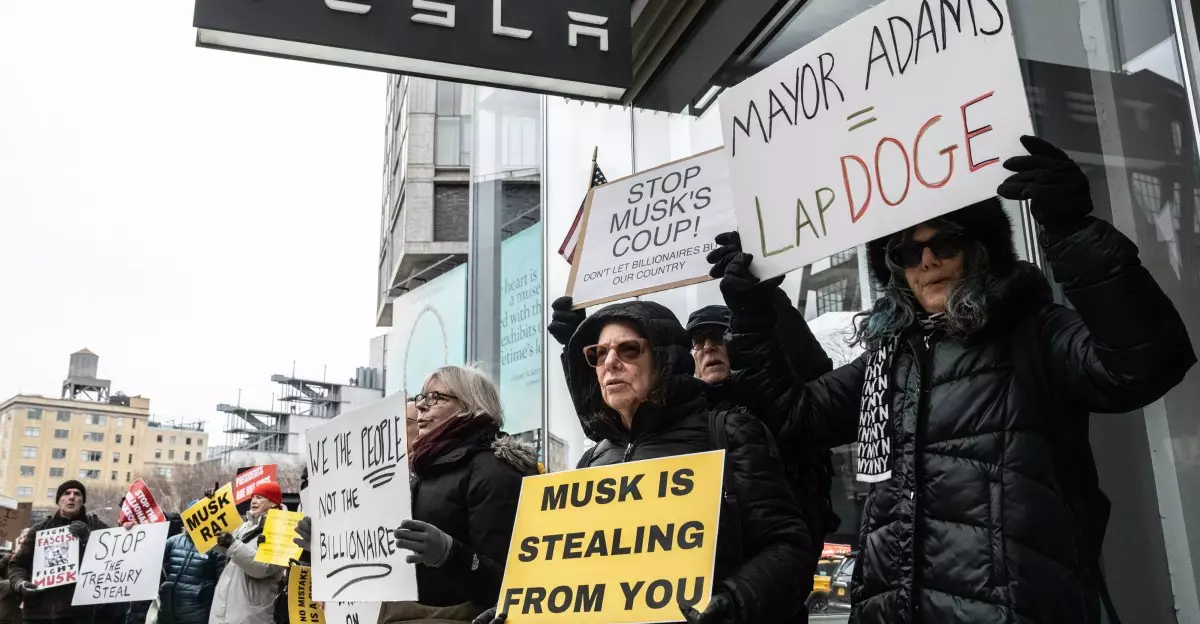In an unprecedented wave of grassroots activism, protestors congregated outside Tesla showrooms across the United States this past weekend, marking the second consecutive weekend of demonstrations instigated by concerns over the company’s leadership and the political actions of its CEO, Elon Musk. The movement has gained momentum, prominently displayed through the trending hashtag #TeslaTakeover on social media platforms like Twitter and Bluesky. While the protests may not have drawn massive crowds, their occurrence in various cities—from metropolitan hubs like New York to suburban enclaves such as Golden Valley, Minnesota—signals a growing sentiment among consumers and investors alike.
The catalyst for these demonstrations appears rooted in the escalating apprehensions regarding Musk’s dual roles as both a corporate leader and a political influencer. Since being appointed to head the Department of Government Efficiency under the Trump administration, Musk’s controversial affiliations and actions have left many questioning the values and integrity of Tesla as a brand. The protests are emblematic of a broader movement against perceived corporate complicity in divisive national politics.
The groundswell of dissent is underscored by the increasingly unease of Tesla investors, who have witnessed a startling 21% decline in the company’s stock price since the inauguration of Donald Trump. The sentiments shared during a recent internal meeting, where some employees expressed that “the company would be better off if Musk resigned,” reflect a fracture within the organization itself. This internal discord raises questions about how leadership decisions impact not only employee morale but also investor confidence.
As investors and employees voice their concerns, it becomes clear that the fallout from Musk’s controversial political maneuvers is not just limited to public perception but reverberates through the company’s financial health. Thus, the protests can be seen as a desperate plea for organizational integrity—a call to return to the values that once made Tesla a beacon of innovation and ethical responsibility.
Voices from the Streets
Large gatherings featured chants such as “Don’t buy swasticars” and “Elon Musk can go to Mars; we don’t need your Nazi cars,” illustrating the fervor and emotional weight behind the movement. These slogans reflect an urgent desire to disassociate the Tesla brand from far-right ideologies that Musk has been accused of endorsing. Notably, the protests have drawn the participation of influential figures like actor and activist Alex Winter, who has been vocal about his disapproval on social media.
Moreover, the multifaceted nature of protest has seen various methods of dissent emerge. Not strictly limited to traditional picketing, individuals such as musician Sheryl Crow have utilized social media to voice their stance, sharing visuals of Tesla vehicles being removed from their properties, symbolizing a rejection of the brand’s current trajectory. Crow’s declaration of alignment with different values speaks volumes, interpreting consumer choices as ethical statements within the socio-political landscape.
What these protests capture is not merely a localized rejection of Tesla as a company, but rather a significant reflection of a society grappling with the intertwining of corporate influence and political authority. The grassroots nature of the demonstrations highlights how consumers are increasingly holding corporations accountable, urging them to align with societal values instead of compromising them for profits.
Expectations align with future protests planned for major holidays and significant dates, suggesting that this movement is poised for growth. Scheduled events across multiple cities hint at the possibility of maintaining momentum, indicating that this wave of protest could evolve from isolated instances into a more cohesive and sustained campaign.
The protests outside Tesla showrooms represent a critical juncture in the relationship between consumers, corporations, and their leaders. As individuals express their discontent towards Musk’s leadership and the company’s policies, it becomes evident that the public is seeking accountability and a return to ethical standards. This illustrates a powerful understanding that consumer power lies not just in purchasing choices but also in the ability to mobilize for change. As the landscape continues to shift, the voice of the consumer will undoubtedly play a pivotal role in shaping the corporate ethos of the future.

